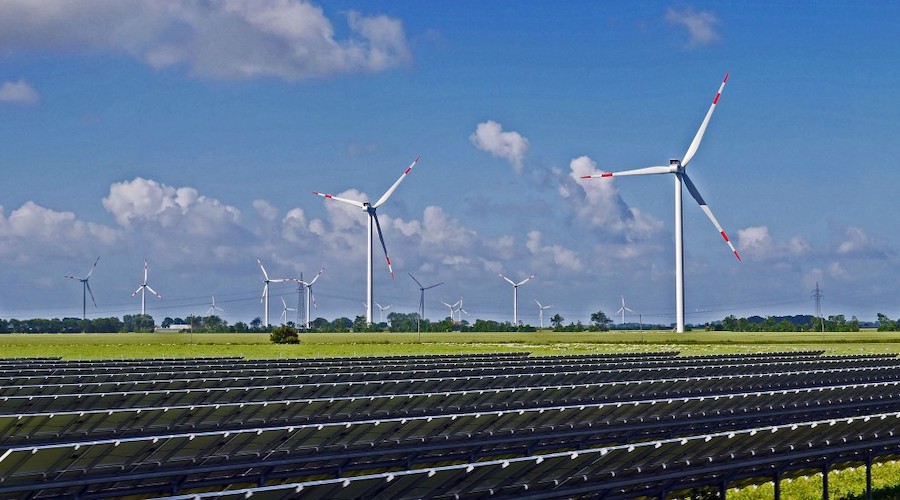Smelting giant Korea Zinc to invest $6.6 billion in green power

After nearly half a century expanding its bread-and-butter business into one of the world’s largest metal smelting operations, Korea Zinc Co. is setting its sights on renewable energy to cut costs and drive growth.
The Seoul-headquartered zinc, gold, silver and lead smelter plans to invest $6.6 billion over the next eight years developing solar and wind power generation and green hydrogen production, with aim of meeting its RE100 goal of using electricity generated entirely from renewable sources, according to Yun Choi, Korea Zinc’s vice chairman and heir apparent.
The investments are part of a broader move to become less dependent on traditional sources of energy, leveraging Korea Zinc’s world-class know-how in metal extraction, Choi said, insisting the company isn’t just following a global trend some have dismissed as greenwashing.
“We have always been an extreme user of electricity,” Choi, 47, said in an interview in Seoul. “As a group, all over the world, we probably spend $300 million on electricity a year. We always have several projects going on to de-carbonize and achieve cheaper electricity.”
Korea Zinc is also seeking to cut carbon emissions amid increasing pressure from regulators and investors to address environmental, social and governance concerns. Only 11 out of 46 metal and mining companies had carbon-reduction targets that match levels needed for the United Nations’ goal of limiting global warming, according to an analysis by Bloomberg Intelligence published in August. Korea Zinc wasn’t included in the analysis.
Many of Korea Zinc’s renewable projects are in mining-heavy Australia, where billionaire resources magnate Andrew Forrest is planning a factory for making hydrogen-producing electrolyzers.
During a rare interview, Choi, who majored in English literature at Amherst College in Massachusetts before his father insisted he pursue a different career, pointed to a large photo hanging on the wall, showing a 124-megawatt-hour solar farm the company built in 2018 in Australia — the country’s biggest at the time.
While the 500-acre farm (about the size of Monaco) is now providing a quarter of the electricity for Korea Zinc’s Sun Metals’ zinc refinery in Queensland, the company is seeking to boost that to 85% by 2025, with the remaining 15% coming from solar and wind projects under development at another subsidiary Epuron, an Australian energy company that Korea Zinc bought last year.
Korea Zinc is also looking to produce green hydrogen in Australia, with the ultimate goal of half a million tons by 2050 when the company aims to reach its RE100 goal, Choi said.
The third plank of Choi’s so-called “Troika Drive” revolves around leveraging Korea Zinc’s metal extraction know-how into recycling batteries.
“We’re able to extract various forms of zinc, copper, lead, precious metals and other valuable metals from secondary waste materials,” Choi said. “We are able to extract everything valuable from dirty material.”
Korea Zinc is in talks with LG Chem Ltd. to build a plant that would manufacture precursor, a key component used for making cathode-active materials for batteries, local media reported last month. Choi declined to comment, but confirmed the company is in talks with partners for battery recycling.
Korea Zinc plans to have a recycling plant up and running as early as 2025, when a large number of spent batteries are expected, he said. The company’s recycling process of pyrometallurgy and hydrometallurgy can extract at least 80% of lithium, 95% of cobalt and nickel and 80% of copper from second-hand batteries, according to the company.
“Korea Zinc is known for extracting metals at a very low cost and at a very high quality, as much as it could from rocks,” said Will Byun, analyst at NH Investment & Securities Co. “The question is how much it can reduce the cost to beat competitors in China.”
Choi’s ambitious plans are backed by a profitable, cash-rich business. Korea Zinc posted a record 1.1 trillion won ($855 million) operating profit in 2021 on revenue of 9.9 trillion won. The company has about 2 trillion won in cash and cash equivalents and little debt.
“Korea Zinc’s balance sheet is unbelievably good,” said Davis Woo, a fund manager at NH-Amundi Asset Management Co. “Cash has been piling up every year and they need to spend it. I think they’re making the right choice on these new investments.”
Choi hasn’t quite let go of his literary ambitions, either. As the interview concludes, Choi hands Bloomberg a slim volume titled “The Mission Book,” which he wrote in English and distributes to employees.
“Our mission is to become the best zinc refinery,” the 27-page guide says on its first page. “This means we are the safest, the most environmentally responsible and the most competitive zinc refinery in the world.”
(By Heejin Kim and Peter Pae, with assistance from Annie Lee, Yi Zhu, Archie Hunter, Mark Burton, Ali Izadi-Najafabadi and Shinhye Kang)
{{ commodity.name }}
{{ post.title }}
{{ post.date }}




Comments